MissingSchool was featured in an article from Northern Beaches Mums. To view the original article click here.
Access to school is a right for every child, yet an untold number of children face isolation due to a blind spot in Australia’s education system. Up to a third of school-aged students suffer from complex medical and mental health conditions, with many forced to ‘give up’ on school while they’re sick.
Fortunately, things are starting to change. Assistive telepresence robots, Zoom, Teams, and heavy campaigning from organisations including my charity, MissingSchool, are starting to improve things for kids around the country.
If your child is one of the many facing time out of the classroom due to a critical or chronic health condition, here are three key focus areas that can help bridge the gap and regain a sense of control over the situation.
Don’t underestimate the impact of your child’s absence
There’s a common misconception that only children who miss months or years of school are at risk of feeling the consequences of their absence. However, at such a crucial time in their lives, frequently missing just a few days of school here and there due to illness can impact their social ties, the way they connect with their school community, and their ability to transition back into the classroom.
Regardless of how long your child is expected to be absent from school, make sure to emotionally validate their experience. Talk to your child about how they feel – not just from an education perspective, but from the perspective of seeing friends, playing sports, or even just maintaining a sense of normalcy during what can be a very confronting time for everyone involved.
Explore telepresence technology
Telepresence technology means students with significant illness or injury remain able to connect with and participate in their regular school, even while physically absent. Options range from static technology such as Zoom or Teams to more advanced telepresence robots such as those used by MissingSchool.
Telepresence tech allows children to see and hear their teachers, be seen and heard, receive the same instruction as their peers, have the agency to socialise with friends, and participate in as much of the school day as possible with their classmates. MissingSchool’s data shows that having a telepresence service in place for your child can support their transitions in/out and back to school.
Know your child’s rights and needs
Unfortunately, often teachers aren’t well-versed in what can be done to provide your child with the tools needed to stay connected throughout their diagnosis and treatment. For parents, this means understanding and advocating for their child’s equity provisions and needs is essential to ensure they are seen and heard even when they’re not in the classroom.
The Disability Standards for Education sets out requirements for the inclusion of kids with medical and mental health conditions, ensuring they can access and participate in education in the same way as their peers.
Asking the school for an individual learning plan, and working collaboratively with the school to develop it, is a great first step in establishing adjustments, and additional support to meet your child’s needs. For example, do they need to sit closer to the whiteboard when in class? Do they need extra time to complete tests or assignments? Do they need assistive devices?
Advocating for your sick child’s access to quality education and the adjustments they need is essential to keeping them connected – whether it’s from home, the hospital, or even in the classroom.
About the author
Megan Gilmour is the CEO and co-founder of MissingSchool, an Australian non-profit organisation that helps seriously sick children stay connected to school. Gilmour has dedicated the last 11 years of her life to advocating for the needs of these children and their families, leaving a career in social and economic development spanning 24 countries.
Gilmour’s passion for helping sick children began when her own child was diagnosed with a rare medical condition. She quickly realised that there were many barriers preventing seriously sick children from accessing the education they need to maintain hope and the fight for life. As a result, Gilmour co-founded MissingSchool with two other mothers in similar situations, to trailblaze change.
Through MissingSchool, Gilmour has been able to collaborate with hospitals, schools, and policymakers to drive action on the challenges faced by seriously ill children and their families. She has studied solutions in six countries and led the organisation to develop extensive resources and a unique service to help children stay connected to their learning, peers, and schools while they are undergoing medical treatment.
Gilmour’s work has been recognised both nationally and internationally. In 2018, she was a finalist for the ACT Australian of the Year Awards. She has also been recognised as one of AFR’s 100 Women of Influence, and was awarded the Telstra ACT Business Woman of the Year for Purpose and Social Enterprise in 2019. She is a Churchill Policy Fellow and a 2020 Deakin University Alumna of Year.
